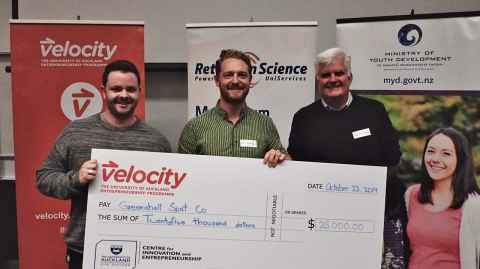‘Super baby’ mussel nursery wins Velocity Challenge
30 October 2019
A business start-up with plans to improve the shellfish industry by cultivating mussel ‘super babies’ has been named the overall winner at the 2019 Velocity $100k Challenge.

Aquaculture technology company The Greenshell Spat Co., the brainchild of University of Auckland students Will McKay and Brad Skelton, won $25,000 worth of seed capital, for their shellfish nursery project that aims to reduce the time taken to raise baby mussels, known as spat, as well as drastically cutting the juvenile loss rate.
Velocity is a student-led entrepreneurship programme open to all students and staff at the University of Auckland and delivered in partnership with the Business School’s Centre for Innovation and Entrepreneurship.
A core component of the Velocity programme is the Velocity $100k Challenge - a competition where participants have the opportunity to win seed capital and a coveted place in the University’s six-month incubator Venture Lab, where they receive mentorship, work space and other support.
Brad and Will are both PhD students with complementary research areas. Brad, who is a student in the School of Biological Sciences, is an expert in Greenshell™ mussel spat settlement and retention, while Will, a student at the Institute of Marine Research, is an expert on shellfish nursery technology.
New Zealand’s Greenshell™ mussel industry, worth in excess of NZ$300 million, grows adult mussels from juvenile spat that wash ashore attached to seaweed on Northland’s Ninety Mile Beach.
Approximately 80 percent of the country’s mussel farms source their spat from Ninety Mile Beach. However, up to 95 percent of spat do not survive being seeded onto mussel farms, which severely constrains the industry’s growth. Furthermore, with the industry currently undergoing rapid expansion, there is considerable, ongoing pressure on wild spat supplies, making the early stages of mussel farming difficult to predict and hard to manage.
Brad and Will are working on a device that raises seed mussels to larger sizes, in order to increase the successful transfer to growing ropes on mussel farms. This will drastically reduce spat losses and remove the unpredictable on-farm nursery stage of production.
This significant increase in efficiency is achieved through the use of an enhanced feeding system that directs water upwards and around the spat, providing them with plenty of food.
The technology we have designed will reduce mussel cultivation and harvest time from 18 months down to just 12 months and significantly increase output, with no additional cost to farmers.
“The technology we have designed will reduce mussel cultivation and harvest time from 18 months down to just 12 months and significantly increase output, with no additional cost to farmers,” says Will.
Director of the Centre for Innovation and Entrepreneurship, Wendy Kerr, says, “We are always excited and expectant of each year’s cohort of Velocity participants, whether or not they have won a place in the competition. Taking part in the Velocity programme opens up so many experiences and access to knowledge, networks and skills. Many of our Velocity alumni have gone on to become business leaders or create world-changing ventures."
With faster growing times and a huge reduction in spat loss, Brad and Will believe they can revolutionise the shellfish industry.
The pair plan to test out their prototype over summer on a marine farm in Mahurangi before scaling up their project for trial on mussel farms throughout the country.
For the full list of prize winners, visit: 2019 Velocity $100K Challenge competition winners announced
Media queries
Miranda Playfair | Media Adviser
Mob: 021 063 8393
Email: m.playfair@auckland.ac.nz